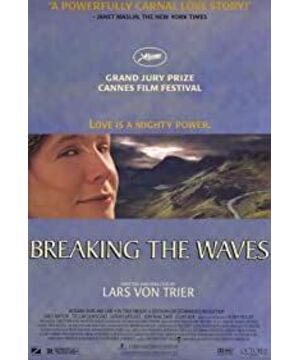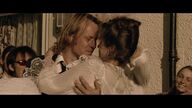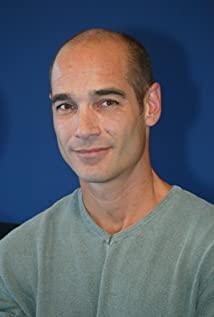In fact, I have always wanted to watch another one, the first of the trilogy, "Broken Waves," which is the literal translation anyway, and there is another translation called the Unbearable Pain of Life. Count me mean, forget it, let's translate it literally. Judging from the perspective of the hasty consumption era or the rationality of normal modern people, the love of Beth, a Nordic woman, is so bizarre and absurd. The translation of the disc I bought was bad, and the actor's English was also very poor. So, during the process of watching it, I was bored with the actor Emily.
Von Trier’s mirror language is unfamiliar and difficult to understand this time. Each paragraph is like unfinished. Then the picture immediately jumps to another paragraph. Although it is not intended, it is always unwilling. All film critics are saying that this is a story about faith, sacrifice, and love. I will add one more, pure.
If you have ever seen more "pure" love than this, remember to tell me. I haven't seen it anyway.
God is Beth's loyal belief, and the late father is Beth's loyal belief. Love is Beth's highest belief. Newcomers in the West hold weddings in churches. The priest always asks, whether the other person is born, old, sick, or died, will you never leave? In 158 minutes, "Breaking the Waves" explained the rituals of the church Li, which seemed to be procedures, but in the hearts of Westerners, it was like a curse. "Beth is not living for her, she is living for you now." Duoduo said to Ion, who was paralysed on the bed.
"I can't even make love to her." Because the church does not allow divorce, Ion asks Beth to find a lover while she is young, but Beth flatly refuses. Unless, doing so can save Ion's fragile life. I remembered that Dali said that the reason why people have sex is because they have to live. As long as humans no longer fear death, then humans don’t need to have sex anymore. It is mentioned in "The Notes of a Wild Man" that African wild elephants are used to living in groups, and whenever their companions are about to die, they will make sexual intercourse to try to arouse their companions' desire to survive. The power of love and life is the same. No wonder the depth and fear of love can always be incomparably close. Ion convinced Beth that as long as he could pass on the power of sex with him, he would have the strength and determination to live.
Beth really believes that love is her highest belief. If having sex with a stranger can arouse the courage of her husband to survive, and let Ion's body blood gain the flow of power again, it doesn't matter who you have sex with, what's important is to convey and sense the breath of life to her husband. The actions of sex and love can be separated, and the object remains in fact the same body. Although Beth, who was lying under the strange man, burst into tears and sobbed. Ion's short-term recovery strengthened Beth's determination, and everyone who noticed it opposed it. In the traditional and strict Danish village, the church would never allow such a vulgar woman to remain in the church. This is not the first conflict between God and Ion in Beth's heart. In fact, every passage in the movie where Beth prays to God in church is a conflict, but this is the most intense one. In "The City of God", St. Augustine used the church as the representative of God’s power in the secular society, because human beings are born with original sin. To be redeemed and become a better person, one must approach God step by step. , Church society is an inseparable link. As a result, the power of the church in the secular society was established, and the church also began to rule the secular society for a long time in the Middle Ages. But as long as Beth knows, the power of the church is not equal to God. Although Augustine established the position of the church, the church is still far away from God after all. The true supreme God in Beth told her that to save Ion's life, she must persist in faith in this way. This is the purest faith, the purest love. She doesn't have herself at all, or Ion is herself.
The sister-in-law who really loves Beth and the doctor Richardson told Beth to stop, and the strict mother warned Beth to continue her fate, and even said to Beth in a cruel way, "He is a patient, he is not at all Know what I said." Beth's answer was, "Because you didn't save your brother like this, he died." Beth even went to be a prostitute.
Not only the purity in love, but even a kind of spiritual transparency. "Bible Song of Songs" says that love is colder than death, but love is the most beautiful clothes of lovers. The vigorous vitality of making love and the dying Ion let the blood in his body get rid of the dead air, and the activity started to flow. Not only is it impossible to use "sacrifice" to describe Beth's actions, the term "sacrifice" still includes grievances and acknowledgment of one's own concessions, and it is the highest degree of concession. For Beth, who doesn't have herself at all, or who has long been fused with Ion, this is not a "grief" nor a concession in any moral sense. If you say grievances, the oppression of secular social forces does give Beth a grievance, but this grievance has nothing to do with Ion. Yu Zheng has nothing to do with it. The power of secular society cannot penetrate into Beth's heart. Belief territory.
The pureness, cleanliness and firmness of the domain of faith, resist the invasion of secular social forces, and strictly defend the supreme love. At this moment, the love here no longer needs to be defended, and it has been the most complete and thorough characterization long ago when the power of Beth's life and Ion merged into one. Being expelled by the church, bullied by the children in the village, Ion's condition has also taken a sharp turn...The shock of the secular society cannot shake Beth at all. However, if she can never see Ion again, then the meaning of this salvation and faithful maintenance of faith will of course be wiped out. Therefore, Bess chose to be wiped out.
It fits her heart completely. If I can't save you, I can't save myself. Of course, the survival of the body is meaningless. Even, this ending was as long as I expected, otherwise, if it were not so cruel, how could von Latier be hailed as a master of human nature in Ling Chi? However, von Latier gave the audience hope again. First, Richardson insisted on burying Beth, even though her soul was going to hell. Then Ion, who was miraculously recovered, stole Beth’s body and threw it into the ocean. At the same time, she never screamed. The church chimes repeatedly.
But I laughed at von Latier secretly. It's enough to end Beth's ashes. He thinks that the death of Beth he arranged is enough to make all the audience shake their breath, and fail to return to their souls. Then use the suffix to add light to the tone. But if Beth's ashes were wiped out in exchange for the restoration of Ion's vitality, there would be no loss in this love redemption. In the realm of noble faith, Beth does not need to be recognized by the secular society or reluctantly "forgive". The added light and lustre is still an area that has nothing to do with Beth's pure soul, and cannot erode the people who had been in heaven and overlooked the world. Her pure eyes. The so-called "Ling Chi humanity" is actually only meaningful in the secular society. In Beth's belief and love, "Broken Waves" has long given the audience infinite light. For whom does the death knell sound like this?
View more about Breaking the Waves reviews











